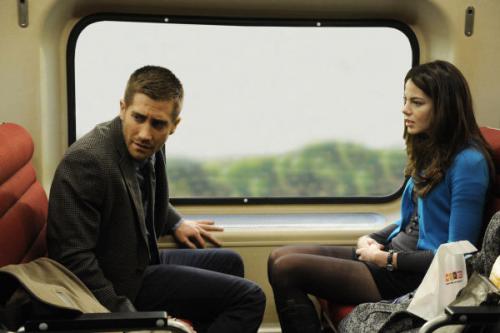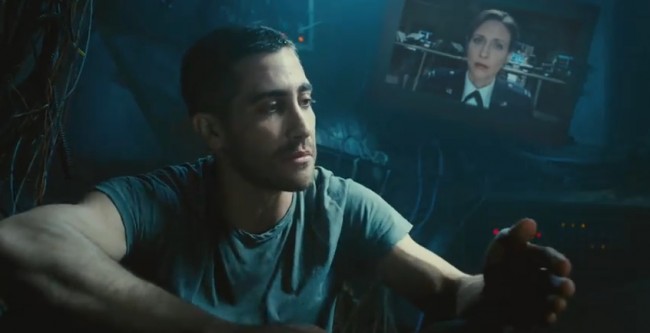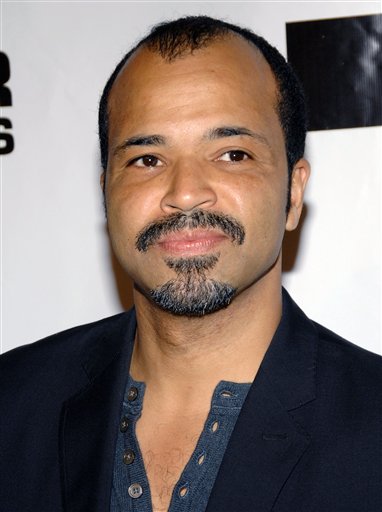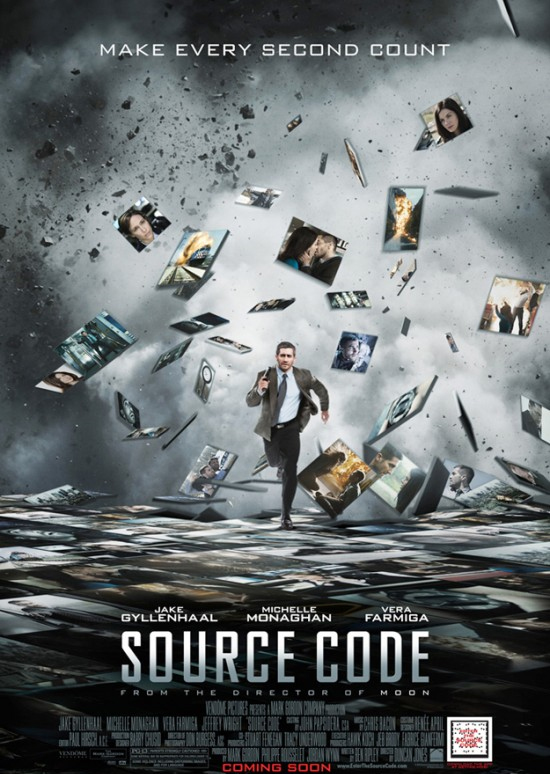
I don’t see films a second time in a theater, not typically. There is too much else to see – movies that go back 80 years that I have to catch up on. And come on, if I spent my time seeing everything again and again I wouldn’t have a real life. What good is movies boosting your life if you don’t have enough time to live your life? How about those DVD platinum releases with ten extra hours of bonus footage? A waste of time if you ask me, not unless it’s “Blade Runner” (1982) or “Brazil” (1985) or the “Alien” movies, something with a fascinating checkered history. There are 101 activities that I’d rather get to then see two dozen movies in a given week, seventy-five percent of those activities involve scoring with a woman. Movies are supposed to give us an idea on how to live life, not take away from life entirely.
Exceptions, of course. Over the weekend I went to see “Source Code” for the second time. For one, my woman hadn’t seen it yet and she should be familiar with at least ninety percent of what I love in a given year. Also for myself, I wanted to look for early clues to see if they fit the diagram, and to see if I could admire the structure and pacing of the film the second time around. I definitely could do both the second time.
I saw “Source Code” for the second time on a Friday night in a packed house at the Arclight Theaters in Hollywood, CA. Which made me wonder if “Source Code” is a bigger hit in the metropolitan cities than in more conservative regions in America. Will the Hollywood bankrollers and public recognize director Duncan Jones, the son of David Bowie whose first film was “Moon,” as a major talent? I haven’t talked to anybody as of yet that hasn’t been totally impressed by “Source Code.” Yet I wonder if any of the detractors are snorting over the ending. My thoughts later.
 What a sturdily crafted film this is by Duncan Jones (pic left). Jones’ direction is strongly stylized and patterned in a way that recalls Alfred Hitchcock or Roman Polanski or his contemporary Christopher Nolan of “Memento.” The opening shots that fly over Chicago demonstrates a meticulous foreboding, like target pieces on a grid. The camera then catches a moving train in several cut shots before swooping in, over a lake and towards the window, where Jake Gyllenhaal (his best work since “Zodiac,” 2007) awakens in disorientation as Captain Colter Stevens. Truly a rude awakening, Captain Stevens is not in his body anymore and he has eight minutes to live – a cruel fate that loops over and over again. In-between the eight minute intervals he receives instructions that he must disarm the bomb. His collective reasoning leads him to interpret that he is in some kind of new virtual enhanced SIM computer exercise. He feels that he is being held prisoner by the Army in an experiment that puts him against his will.
What a sturdily crafted film this is by Duncan Jones (pic left). Jones’ direction is strongly stylized and patterned in a way that recalls Alfred Hitchcock or Roman Polanski or his contemporary Christopher Nolan of “Memento.” The opening shots that fly over Chicago demonstrates a meticulous foreboding, like target pieces on a grid. The camera then catches a moving train in several cut shots before swooping in, over a lake and towards the window, where Jake Gyllenhaal (his best work since “Zodiac,” 2007) awakens in disorientation as Captain Colter Stevens. Truly a rude awakening, Captain Stevens is not in his body anymore and he has eight minutes to live – a cruel fate that loops over and over again. In-between the eight minute intervals he receives instructions that he must disarm the bomb. His collective reasoning leads him to interpret that he is in some kind of new virtual enhanced SIM computer exercise. He feels that he is being held prisoner by the Army in an experiment that puts him against his will.
There’s no doubt that the story is make-believe, but it’s one that has concocted a seductive movie logic that you can’t help but to just go with it. For those who adhere to brainy science-fiction, the word “allegory” becomes reverential as well as appropriate here. Yet what I love about “Source Code” is the race against the clock aspects. But the limiting clock makes it difficult to accomplish solutions in such a short time frame. Captain Stevens has to keep going back, piecing together fragmented answers one at a time, also facing the misery of the bomb blasting in his face time after time.
Jones directs without concern on whether his characters will please the audience at every given turn. For example, he doesn’t allow his hero character to be stymied by politeness. He lets Gyllenhaal shove people around and lets him dump their suitcases of belongings. By allowing his actor to do that, he trusts his audience that we will still like him because we know that Captain Stevens knows that he has to regulate his thinking to the big picture. Surprisingly, I felt afterwards both viewings that Gyllenhaal, while sometimes miscast, is irreplaceable for this role. He has the right amount of compassion, devotion and yet frustration that is necessary for him to proceed as a dogged and damned detective. I only felt in the closing scenes that he under-reacts to a newfound situation with him inhabiting new shoes. To me, he should be hyperventilating at least a little.

The women of “Source Code” are integral to making us care. Vera Farmiga (“The Departed”) is the Army technician with a hard head and with a willingness to take and abide to orders. She also makes sense when she says, “I have to give him something,” as in parcel out explanations. Coming from one soldier to another, she believably takes Captain Colter’s words seriously and comprehends their weight. Michelle Monaghan (“Trucker”) has a lovely but ordinary woman quality, the kind of everyday appealing but real woman you wish you ran into on a train. Her Christina Warren is a natural light-spirit who can’t foresee catastrophic events.
 I really admired Jeffrey Wright’s (pic left) performance the first time around as the pragmatic Dr. Rutledge (he believes in science more than in human frailty), but, with more time allowed to breathe during the second viewing, I was amazed by it the second time around. I have to wonder if it was Wright’s idea to give his character a limp, but he is indeed a brilliant doctor with a cripple – he’s a character that lives for creating scientific breakthroughs. Wright is one of the greatest actors on the planet right now, just most people don’t know about it. His debut was as the homeless man who becomes an acclaimed artist in the biopic “Basquiat” (1996), he was a drug kingpin with bi-polar mood shifts in “Shaft” (2000), he was Bill Murray’s nosy but exuberant neighbor in “Broken Flowers” (2005) and made the most of what would seem on page to be a thankless part, he was the enigmatic ally Felix Leiter in “Casino Royale” (2006), he was spot on as Colin Powell in “W.” (2008), and was the skirt-chasing Muddy Waters in “Cadillac Records” (2008). He is an actor of countless attributes, hundreds of expressions, a chameleon gifted with inward and outward transformations.
I really admired Jeffrey Wright’s (pic left) performance the first time around as the pragmatic Dr. Rutledge (he believes in science more than in human frailty), but, with more time allowed to breathe during the second viewing, I was amazed by it the second time around. I have to wonder if it was Wright’s idea to give his character a limp, but he is indeed a brilliant doctor with a cripple – he’s a character that lives for creating scientific breakthroughs. Wright is one of the greatest actors on the planet right now, just most people don’t know about it. His debut was as the homeless man who becomes an acclaimed artist in the biopic “Basquiat” (1996), he was a drug kingpin with bi-polar mood shifts in “Shaft” (2000), he was Bill Murray’s nosy but exuberant neighbor in “Broken Flowers” (2005) and made the most of what would seem on page to be a thankless part, he was the enigmatic ally Felix Leiter in “Casino Royale” (2006), he was spot on as Colin Powell in “W.” (2008), and was the skirt-chasing Muddy Waters in “Cadillac Records” (2008). He is an actor of countless attributes, hundreds of expressions, a chameleon gifted with inward and outward transformations.
The all-important ending is the last thing to talk about. You can almost feel the compromised happy ending folding over, and the question is: How well-earned is a happy ending here? I think the general moviegoer who demands a happy ending will get their heap serving. Yet what spun me for a loop – and this is where I think the film is brave – is that it takes an appearance of a pat happy ending and then brilliantly covers it tracks by throwing in twists that induce double, if not, triple meanings. The what-ifs of the allegory get more complex. Now really, who but pretentious twits honestly think that “The King’s Speech” is better than “Source Code?”





